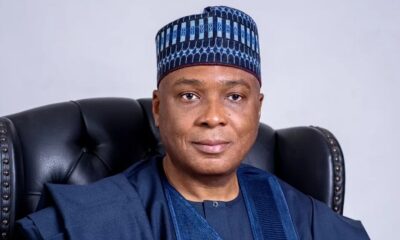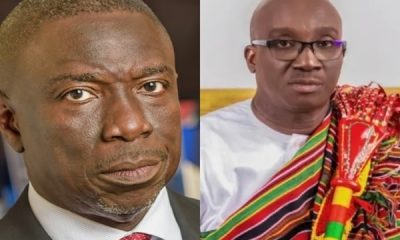Economy
Windfall tax: FG insists on sanctions for defaulting bank chiefs

The Federal Government has reiterated that the principal officers of banks who refuse to comply with the law on the windfall tax on banks’ foreign exchange profits will be sanctioned.
The government’s position was reiterated on Monday at the National Assembly when the Minister of Finance, Wale Edun, and the Chairman of the Federal Inland Revenue Service, Zack Adediji, met with the finance committees of both chambers on the Amendment of the Finance Bill, 2024.
Last week Wednesday, the Senate gave expeditious passage to President Bola Tinubu’s request to amend the Finance Act to impose a one-time windfall tax on banks’ foreign exchange profits in 2023.
A windfall tax is a higher tax levied by the government on sectors or businesses that have disproportionately benefited from favourable market conditions.
The President said the money would be part of the revenue used to fund the additional N6.2tn added to the 2024 budget.
The bill which has passed the second reading states, “The Federal Inland Revenue shall assess the realised profits, collect, account, and enforce payment of levy payable under section 30 in accordance with the powers of the Service under the Federal Inland Revenue Service (Establishment) Act 2007; and in the exercise of its functions in 32(a) above, may enter into a deferred payment agreement with the assessed banks, provided that such deferred payment agreement is executed on or before December 31, 2024.
“Any bank that fails to pay the windfall profit levy to the service and has not executed a deferred payment agreement before December 31, 2024, commits an offence and shall, upon conviction, be liable to pay the windfall profit levy withheld or not remitted in addition to a penalty of 10 per cent of the levy withheld or not remitted per annum and interest at the prevailing Central Bank of Nigeria minimum rediscount rate and imprisonment of its principal officers for a period of not more than three years.
“Financial year means either the year commencing from January 1, 2023 to December 31, 2023, or any period within the financial year not aligned with the calendar year comprising twelve calendar months of the bank’s financial activity,” it added.
Speaking at the meeting, Edun said, the “bank windfall” profit levy, though small still constituted an important contribution to government finances at a time when revenues had substantially increased despite minimising taxes.
In his explanation, the FIRS chairman explained that the windfall tax was not a new tax imposed on banks.
Adedeji said, “These are the gains that you have without any contribution from you, without any value addition. They result from the effect of an adverse activity on others. And who are these others? If you look at the report of all manufacturing entities in the last one and a half years, you will discover that a lot of registered companies recorded huge losses from exchange transactions.
“Anywhere in the world, your duty as the government is to redistribute the wealth to sustain the progress and prosperity of the nation.
“So the loss suffered by manufacturing, as a result of these foreign gains, which is being recorded in the bank is what the government seeks to redistribute. And that is why we have this levy.
“So we seek your permission and your understanding in balancing this economic inequality that has occasioned due to the circumstances that we find ourselves.”
Speaking on the sharing formula, the FIRS chairman proposed that it be distributed 50/50 between banks and the government.
He said, “These gains that are realised, the levy proposal today is 50 (per cent) for the bank and 50 (per cent) for the government.”
Raising the issue of penalty as stated in the bill, Senator Isah Jibrin ( APC, Kogi East), asked that the bill be more explicit.
He said, “My area of worry is concerning the penalty, we need to be very explicit on it.
“On the issue of penalty, here it is stated, 10 per cent of the tax withheld or not remitted per annum and interest at the prevailing Central Bank of Nigeria MRR. So what are we going to do? 10 per cent is like coming from nowhere, so I would suggest that we align the MRR.”
“Then at what point does the issue of imprisonment of the officials come in? At what point do we now say, okay, enough is enough and the officials should be arrested after default, is it after a month, a year, two years, or three years.”
Responding to this, Edun said it was unlikely that banks would defy the government, but noted there were penalties for those who defaulted.
The finance minister said, “To be fair to the banks there is no reason to assume that’s what they trying to do. Let us give the benefit of the doubt to one another.
“Well there has to be, there has to be something that will serve as a deterrent. The penalties have to be there. And at the end of the day, tax evasion is a criminal offence.
“For underreporting of profits by the bank, we have enough technical ability to look at what the bank’s audited accounts say and track the level of foreign exchange and the profits therefrom.”
Adedeji also allayed fears regarding possible cases of underreporting.
He noted that the CBN in a memo in September 2023 and March this year had directed commercial banks in the country not to touch or spend the profits they made from foreign exchange transactions.
Economy
More Nigerians to experience poverty by 2027 – World Bank

The World Bank’s latest Africa’s Pulse report has projects a grim future for Nigeria, with poverty expected to rise by 3.6 percentage points by 2027.
Released during the IMF and World Bank Spring Meetings in Washington, DC, the report cites Nigeria’s reliance on oil, economic fragility, and governance challenges as key drivers.
It highlights the country’s structural economic weaknesses, dependence on oil revenues, and national fragility as key barriers to meaningful poverty reduction.
“Poverty in resource-rich, fragile countries, including large economies like Nigeria and the Democratic Republic of Congo, is projected to increase by 3.6 percentage points between 2022 and 2027,” the report stated.
Despite recent growth in Nigeria’s non-oil sector during the last quarter of 2024, the World Bank warns that this progress is unlikely to translate into widespread poverty alleviation due to ongoing fiscal and institutional challenges.
The report emphasizes that Sub-Saharan Africa remains the world’s poorest region, with an overwhelming 80% of the globe’s 695 million extreme poor residing there in 2024.
Within the region, half of the 560 million extremely poor people were located in just four countries, including Nigeria.
In stark contrast, South Asia accounted for 8% of the world’s extremely poor population, East Asia and the Pacific 2%, the Middle East and North Africa 5%, and Latin America and the Caribbean 3%.
The World Bank attributes the rising poverty in Nigeria and similar economies to weakening oil prices and fragile governance structures, noting: “This follows a well-established pattern whereby resource wealth combined with fragility or conflict is associated with the highest poverty rates, averaging 46% in 2024, which is 13 percentage points higher than in non-fragile, resource-rich countries.”
Meanwhile, non-resource-rich countries in Africa are experiencing stronger economic growth and faster poverty reduction, buoyed by high agricultural commodity prices and more resilient fiscal policies.
To reverse Nigeria’s downward poverty trend, the World Bank recommends reforms that prioritize inclusive economic growth and stronger public financial management.
It calls on the government to focus on “improving fiscal management and building a stronger fiscal contract with citizens to promote inclusive economic development and long-term poverty alleviation.”
Economy
SEE current exchange rate of the Dollar to Naira

What Is the Dollar to Naira Exchange Rate at the Black Market (Aboki FX)?
Here is the Dollar to Naira exchange rate at the parallel market, popularly known as the black market (Aboki fx), for Tuesday, April 23, 2025.
You can exchange your dollars for naira at the following rates:
Black Market Exchange Rate (Lagos – April 23, 2025):
According to sources at the Bureau De Change (BDC), the exchange rate at the Lagos parallel market saw traders buying at ₦1610 and selling at ₦1620 per US dollar.
It’s important to note that the Central Bank of Nigeria (CBN) does not recognize the black market. The CBN advises individuals seeking foreign exchange transactions to do so through their banks.
Dollar to Naira Exchange Rates
Market Type Buying Rate Selling Rate
Black Market ₦1610 ₦1620
CBN Official Rate ₦1591 (Low) ₦1606 (High)
Note: Forex rates vary across dealers and regions, and actual rates may differ from those listed.
Meanwhile, the Nigeria Customs Service (NCS) has announced the seizure of 298 smuggled items worth ₦7.6 billion between January and March 2025. The NCS also disclosed that it generated a total revenue of ₦1.75 trillion in the first quarter of the year.
Economy
Volvo announces termination of 800 U.S. workers, cites tariff, market decline

Volvo Group has announced plans to lay off up to 800 workers at three of its U.S. facilities over the next three months, citing ongoing market uncertainty and declining demand exacerbated by tariffs introduced under the administration of President Donald Trump.
The affected locations include the Mack Trucks plant in Macungie, Pennsylvania, as well as Volvo Group sites in Dublin, Virginia, and Hagerstown, Maryland.
In a statement on Friday, Volvo Group North America confirmed that between 550 and 800 employees would be impacted.
The company, a subsidiary of Sweden’s AB Volvo, employs nearly 20,000 people across North America.
The layoffs come amid wider turmoil in the automotive and manufacturing sectors, as shifting U.S. trade policy and a series of tariffs continue to drive up production costs. Economists have pointed to the uncertainty surrounding Trump’s trade strategy as a factor undermining both business and consumer confidence, with concerns mounting over a potential economic slowdown or recession.
According to Volvo, the company is grappling with a decline in heavy-duty truck orders, driven by instability in freight rates, anticipated regulatory changes, and the growing financial burden of tariffs. “We regret having to take this action, but we need to align production with reduced demand for our vehicles,” a company spokesperson stated in an email quoted by Reuters.
Volvo’s announcement marks another blow to an industry already navigating a complex web of supply chain challenges and fluctuating market conditions, with other manufacturers also warning of potential cost hikes and disruptions tied to global trade disputes.
-

 News12 hours ago
News12 hours ago2027: Pro-Fubara protesters want suspended Gov to run as Atiku’s VP(Video)
-

 Economy19 hours ago
Economy19 hours agoMore Nigerians to experience poverty by 2027 – World Bank
-

 News14 hours ago
News14 hours agoOborevwori /Okowa: PDP experiencing a rebirth and will soon bounce back-Saraki declares
-

 Politics19 hours ago
Politics19 hours agoLabour Party reaffirms Abure-led leadership after Supreme Court judgment
-

 News20 hours ago
News20 hours agoGovernor Oborevwori’s Defection: A Masterstroke That Handcuffs Delta’s Opposition
-

 News13 hours ago
News13 hours agoEdo poll: How APC allegedly offered witnesses N30m bribe
-

 News19 hours ago
News19 hours ago2027 done deal, more governors joining APC – Ganduje declares
-

 News12 hours ago
News12 hours agoFlights resume as NiMET unions suspend strike






